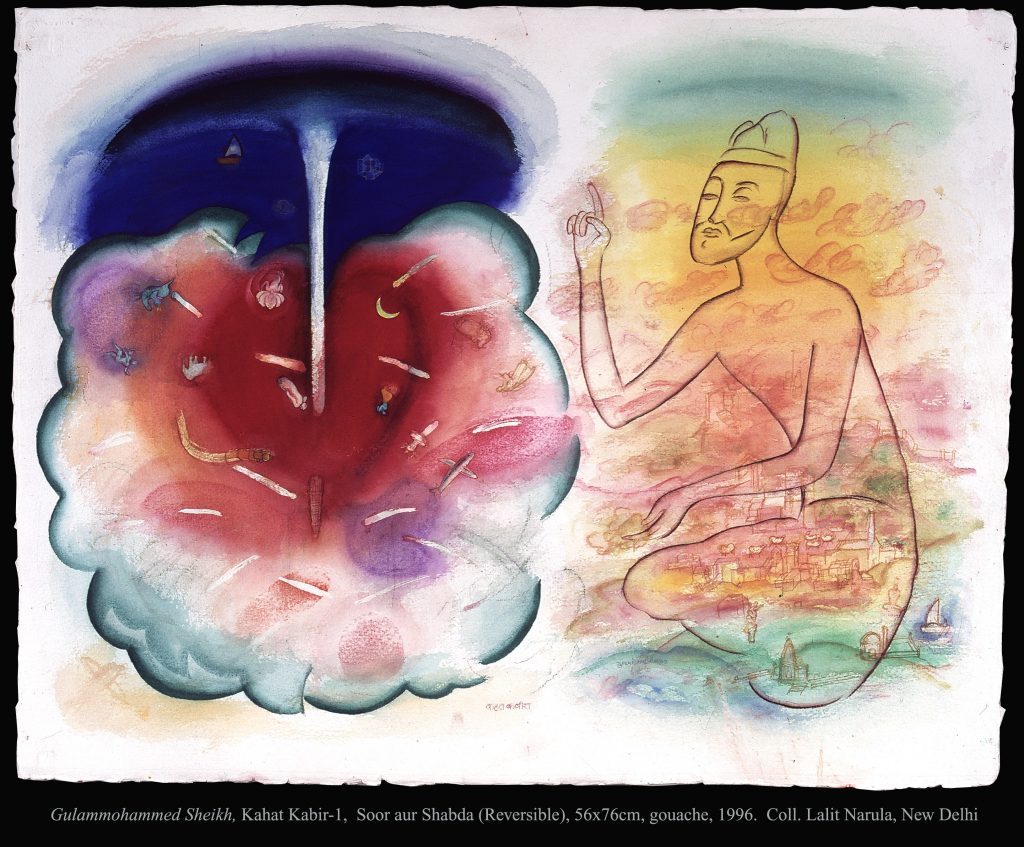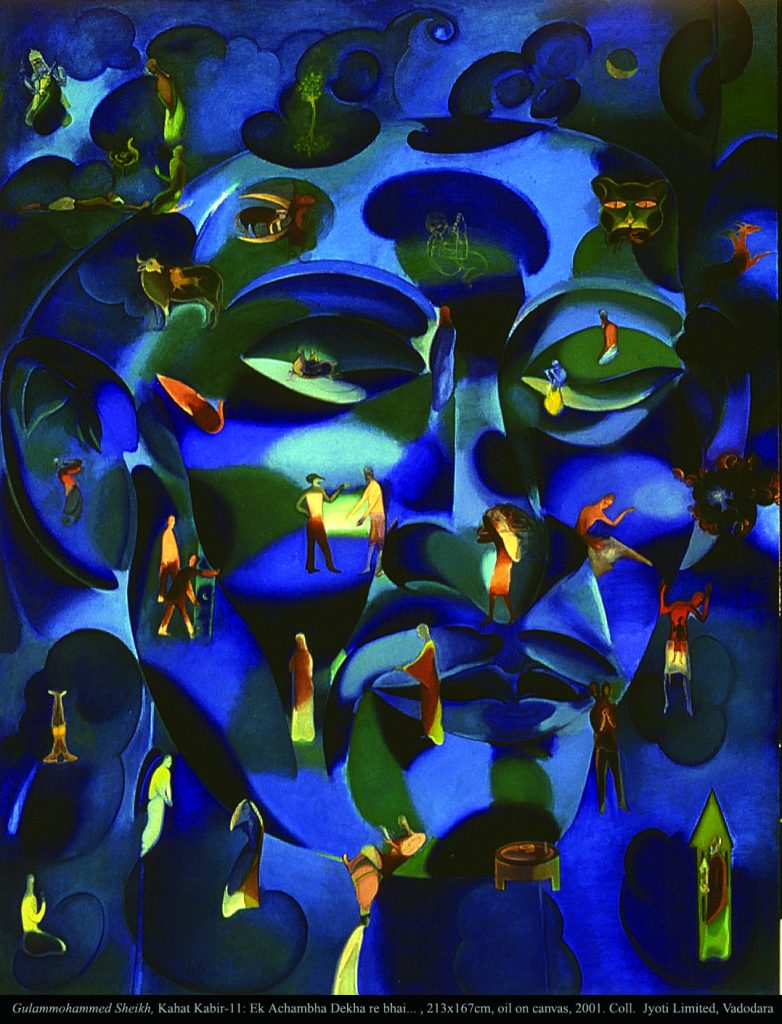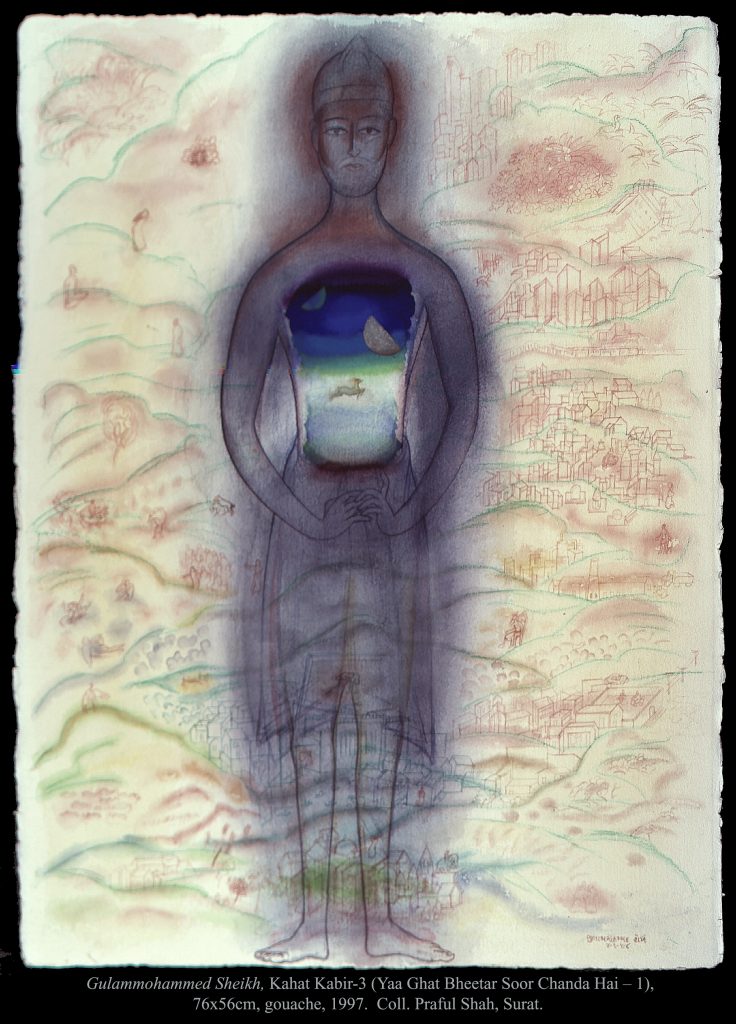Kabir was born in Benares in a Muslim family and is believed to have lived for nearly 120 years, from 1398 to 1518. The family belonged to the Julaha or weaver caste and was a recent convert to Islam because of its caste’s low status in the Hindu social system.
There are a great many legends about Kabir’s life. He was a dissident figure, a “die-hard rebel” and the most “outspoken” of all bhakti poets. In the introduction to his book of translations Songs of Kabir, Arvind Krishna Mehrotra tells us that while most people went to the holy city of Benares to spend their last days, Kabir went to an obscure place called Maghar, a town associated with Buddhists, Muslims and the lower castes since ancient times. He had no regard for religious orthodoxies and social hierarchies and his love for “One Deity” is the most distinguishing feature of his poetry. But perhaps his dissidence is most strongly felt in his disregard for social divisions and his empathy for the voiceless. His is a collective voice. There is neither a single voice nor a single author of the “songs of Kabir”.
To celebrate the many voices and the many sides of Kabir, Guftugu presents a riveting interview with one of his translators, Arvind Krishna Mehrotra; some translations of his songs along with three spectacular paintings by highly acclaimed artist Gulammohammed Sheikh from his series ‘Kahat Kabir’; and finally a soulful rendition of a song by well-known performer Vidya Rao.
Arvind Krishna Mehrotra speaks to Souradeep Roy about his translations of Kabir
From Songs of Kabir
I
जौ पै करता बरन बिचारै।
तौं जनतैं तीनि डांड़ि किन सारै ।।टेक।।
जे तूं बाभन बभनीं जाया।तौ आंन बाट होइ काहे न आया ।।
जे तूं तुरूक तुरुकिनीं जाया।तौ भीतरि खतनां क्यूं न कराया ।।
कहै कबीर मद्धिम नहिं कोई।सो मद्धिम जा मुखि रांम न होइ ।।
Were the Creator
Concerned about caste,
We’d arrive in the world
With a caste mark on the forehead.
If you say you’re a Brahmin
Born of a mother who’s a Brahmin,
Was there a special canal
Through which you were born?
And if you say you’re a Turk
And your mother’s a Turk,
Why weren’t you circumcised
Before birth?
Nobody’s lower caste;
The lower castes are everywhere.
They’re the ones
Who don’t have Rama on their lips,
Kabir says.
II
भूली मालिनीं है एउ ।
सतिगुरु जागता है देउ ।।टेक।।
पाती तौरे मालिनीं पाती पाती जिउ ।
जिसु मूरति कौं पाती तोरै सो मूरति निरजीउ ।।
टांचनहारै टांचिया दै छाती ऊपरि पाउ ।
जे तूं मूरति सांचि है तौ गढ़नहारै खाउ ।।
लाडू लावन लापसी पूजा चढ़ै अपार ।
पूजि पुजारा लै गया दै मूरति कै मुंहि छार ।।
पाती ब्रह्मां पुहुप बिसनूं मूल फल महादेव ।
तीनि देव प्रतखि तोरहि करहि किसकी सेव ।।
मालिनि भूली जग भुलांनां हम भुलांनें नांहिं ।
कहै कबीर हंम रांम राखे क्रिपा करि हरि राइ ।।
The gardener’s wife
Cuts short the brief life
Of the flowers and offers them
To a lifeless stone idol
That a sculptor carved,
Feet on its chest,
Chisel in hand.
Had the idol been alive,
It would have
Lashed out at the sculptor.
It would have seen through the priest
Who grabs all the food
The faithful bring,
Leaving the scraps to the idol.
Not one, not two,
But everyone’s a sucker,
Says Kabir. Not me.
 Gulammohammed Sheikh, ‘Kahat Kabir – I, Soor aur Shabda’, gouache, 56 cms x 76 cms, 1996
Gulammohammed Sheikh, ‘Kahat Kabir – I, Soor aur Shabda’, gouache, 56 cms x 76 cms, 1996
III
झगरा एक निबेरहु रांम ।
जे तुम्ह अपनैं जान सौं कांम ।।टेक।।
ब्रह्मा बड़ा कि जिन रे उपाया । बेद बड़ा कि जहां तैं आया ।।
यहु मन बड़ा कि जेहिं मन मांनैं । रांम बड़ा कि रांमहिं जानैं ।।
कहै कबीर हौं भया उदास । तीरथ बड़ा कि हरि का दास ।।
Answer this and do it quickly,
If you care at all for your devotee.
Who’s greater?
The lord of the universe
Or the one who made him?
The Vedas
Or their source?
The mind
Or what the mind believes in?
Rama
Or Rama’s supplicant?
The question that’s killing me, says Kabir,
Is whether the pilgrim
Or the pilgrim town is greater?
IV
अवधू अैसा ग्यांन बिचारी ।
तातैं भई पुरखि तैं नारी ।।टेक।।
नां हूं परनीं ना हूं क्वांरी पूत जनमांवनहारी ।
कारे मूंड़ कौ न छांड़यौ अजहूं अकन कुंवारी ।।
बांह्मन कै घरि बांह्मनि होती जोगी कै घरि चेली ।
कलमां पढ़ि पढ़ि भई तुरकिनीं कलि महिं फिरौं अकेली ।।
पीहर जांउं न रहूं सासुरै पुरखहिं संग न लाऊं ।
कहै कबीर मैं जुग जुग जीऊं अंगहिं अंग न छूवाऊं ।।
Tell me, wise one,
How did I become
A woman from a man?
I never got married,
Was never pregnant,
But gave birth to sons.
I fucked young men,
Too numerous to count,
And stayed a virgin.
In a Brahmin’s house,
I become a Brahmin’s wife;
In a yogi’s, a lay yogini;
In a Turk’s, I read the kalma
And do as Turkish women do;
And yet I’m always alone
Without a place to call home.
Listen, saints, Kabir says,
This is my body.
I don’t let
My husband touch it
Or anyone else.
 Gulammohammed Sheikh, ‘Kahat Kabir – II, Ek Achambha Dekha re Bhai’, oil on canvas, 213 cms x 167 cms, 2001
Gulammohammed Sheikh, ‘Kahat Kabir – II, Ek Achambha Dekha re Bhai’, oil on canvas, 213 cms x 167 cms, 2001
V
धीरैं धीरैं खाइबौ अनत न जाइबौ ।
रांम रांम रांम रमि रहिबौ ।।टेक।।
पहली खाई आई माई । पीछै खै (खाई?) हूं सगौ जंवाई ।
खाया देवर खाया जेठ । सब खाया सुसार का पेट ।।
खाया सब पटण का लोग । कहै कबीर तब पाया जोग ।
god my darling
do me a favour and kill my mother-in-law
— Janabai (13thcentury)
— trans. Arun Kolatkar
Chewing slowly,
Only after I’d eaten
My grandmother,
Mother,
Son-in-law,
Two brothers-in-law
And father-in-law
(His big family included)
In that order,
And had for dessert
The town’s inhabitants,
Did I find, says Kabir,
The beloved that I’ve become
One with.
VI
आऊंगा ना जाऊंगा, मरूंगा न जीऊंगा ।
गुरू के सबद मैं रमि रमि रहूंगा ।।टेक।।
आप कटोरा आपैं थारी । आपैं पूरिखा आपैं नारी ।।
आप सदाफल आपैं नींबू । आपैं मुसलमांन आपैं हिंदू ।।
आपैं मछ कछ आपैं जाल । आपैं झींवर आपैं काल ।।
कहै कबीर हम नांहीं रे नांहीं । नां हम जीवन न मुयेले मांहीं ।।
I won’t come
I won’t go
I won’t live
I won’t die
I’ll keep uttering
The name
And lose myself
In it
I’m bowl
And I’m platter
I’m man
And I’m woman
I’m grapefruit
And I’m sweet lime
I’m Hindu
And I’m Muslim
I’m fish
And I’m net
I’m fisherman
And I’m time
I’m nothing
Says Kabir
I’m not among the living
Or the dead
 Gulammohammed Sheikh, ‘Kahat Kabir – III, Yaa Ghat Bheetar Soor Chanda Hai – I, gouache, 76 cms x 56 cms, 1997
Gulammohammed Sheikh, ‘Kahat Kabir – III, Yaa Ghat Bheetar Soor Chanda Hai – I, gouache, 76 cms x 56 cms, 1997
